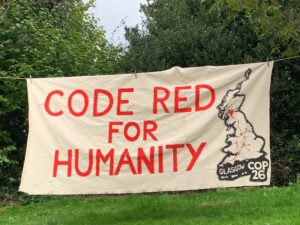Today is the first day of COP26 in Glasgow – the ten-day conference which may well be the world’s last realistic chance to avoid climate breakdown. As policymakers gather from all over the world and negotiate emissions targets and goals, the thorniest problems will be those of climate justice. How to stop the biggest burdens falling on those who have contributed the least to climate change. How to support poorer countries to make the transition to a sustainable future. How to protect the health and wellbeing of the world’s most vulnerable people and ecosystems.
It’s a problem of imagination. All around the world, people, organisations and governments need to imagine fairer, more equal, healthier, more sustainable futures, and take steps towards creating them.
This might seem remote from university life, but in fact, this work of imagination and action is happening in many departments, societies, research projects and collaborations. Each day during COP26, there will be a post from a YSJU student or member of staff, giving their take on climate justice.
First up is Cath Heinemeyer, Lecturer in Arts and Ecological Justice:
Performing the Climate Emergency
 It’s tempting to switch off our emotional responses to climate change, a phenomenon that feels overwhelming, frightening, and irredeemably complex. We are left drifting amid a sea of statistics, opinions, projections and warnings, trying to make sense of what it means to live in a ‘climate emergency’, then invariably giving up as our thoughts snap back to things more within our control in our daily lives.
It’s tempting to switch off our emotional responses to climate change, a phenomenon that feels overwhelming, frightening, and irredeemably complex. We are left drifting amid a sea of statistics, opinions, projections and warnings, trying to make sense of what it means to live in a ‘climate emergency’, then invariably giving up as our thoughts snap back to things more within our control in our daily lives.
The best performance activism can reawaken our emotions – perhaps against our will – can collapse the distance between the big global phenomenon and our own bodies and lives. It can invite us in to a process of imagining alternatives, taking the first steps towards them in our minds.
During three days from 30th October to 1st November, silent red-clad performers known as Red Rebels travelled in relay, with purpose and dignity, the railway ‘veins’ of the UK towards the beating heart of COP26 in Glasgow. They carried a message of simple urgency to the world’s policymakers gathered for the climate conference: that it is now Code Red for Humanity, that there is no further time to waste, that difficult decisions need to be made now.

Escorting one group of Red Rebels on the leg of the journey from York to Manchester this weekend, I watched the performers express in their bodies and faces the grief and compassion that many people feel deep down for the human and animal communities
already threatened by climate change, but can’t afford to express. As I handed out leaflets explaining the Rebels’ journey, people grabbed them avidly, to find out the motivation behind this intrusion into their daily lives, and tweeted photographs of us to Alok Sharma and the rest of the UK government team at COP.
The Red Rebels carried no detailed answers to the wicked problem of climate change with them on their journey. Other performance activists pick up where they leave off, however: reclaiming public spaces as community centres and vegetable gardens, helping young people tune into the ecosystems they live in, sharing stories of environmental problems and solutions. Tomorrow’s post from Clare Nattress is a vibrant example. See you then.


